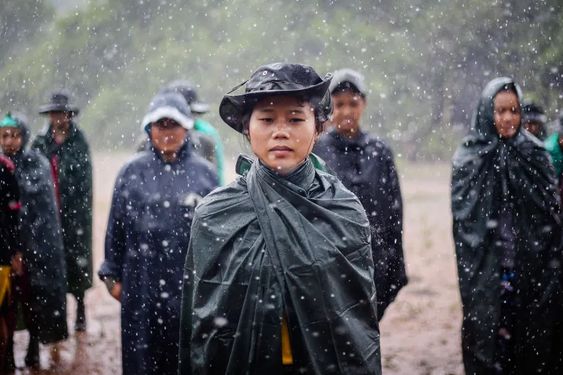World
Despite airstrikes, the anti-coup troops in Myanmar remain optimistic

Air raids, according to groups that rebelled against the military during its power grab in February 2021, are a reflection of its frailty rather than its strength.
In Myanmar, resistance to military authority has been characterised by optimism.
On February 1, 2021, when the military first took over, there were massive, nonviolent protests that resembled a happy street festival. Demonstrators sang in the streets, carried amusing signs, and dressed funny.
There were no illusions about what might happen next in a country where the military services have a history of using brutality against opponents.One protester declared that they would be willing to sacrifice 100 or even 1,000 lives to see the military overthrown.
Two years later, some citizens have gotten involved in the armed struggle among ethnic groups that have long sought greater autonomy. The military is increasingly turning to air power and heavier weapons against their weakly armed adversaries as the nation now appears to be engulfed in a full-fledged civil war.
Estimates have the death toll in 2022 at over 20,000, including both civilians and combatants, second only to Ukraine, but those eager to remove the generals from power remain optimistic.
Albert, a battalion commander for the anti-coup Karenni Nationalities Defence Force (KNDF), which predominantly operates in Kayah State and southern Shan State close to the Thai border, said: “Some of our colleagues have died in battle, but giving up now is not an option.”
If we can maintain our momentum, a breakthrough will occur in 2023.
READ ALSO: Trump asserts truce with Ukraine
There have been about 10,000 attacks and armed clashes between the military and opponents since the coup, according to a new analysis (PDF) published on the eve of the coup anniversary by Tom Andrews, the United Nations special rapporteur on human rights in Myanmar. Violent incidents also occurred in at least 78% of townships between July and December 2022.
That implies that the regime is not any closer to solidifying its hold on the nation, but it also implies that it does not appear to be in danger of collapsing.
“A new balance has been established.” To break the impasse, there must be fundamental changes on all sides, according to Min Zaw Oo, executive director of the Myanmar Institute for Peace and Security and a veteran of the country’s conflict.
“The landscape has stayed the same in overall 2022,” he said, adding that the opposition has been unable to “secure critical places” while the military has failed to return most theatres to “a pre-coup status quo.”
The military has intensified its air campaign in recent months, departing from its custom of mostly employing air strikes to help ground troops or terrorise civilian towns it suspects are supporting resistance fighters.
Currently, it is bombing high-profile targets more frequently, even when there is no ground combat, as shown during a KIO event in November, at the CNF headquarters in early January, and at a PDF base in late January.
Armed opposition groups and advocates for human rights have urged the international community to establish a no-fly zone over Myanmar or a ban on the export of aviation fuel on numerous occasions. Amnesty International revealed last year that the military had access to fuel that had been transported to Myanmar ostensibly for commercial use.
The resistance’s optimism is still evident in the face of this strong onslaught.
According to Myo Thura Ko Ko, spokesman for the mixed command Cobra Column, which is led by the KNU and PDF, “we hoped the military would use airstrikes on us one day.” He believes the regime is slipping back because of its increased reliance on airstrikes.
He continued, “When their men are losing on the battlefield or when their morale is down, the military uses air strikes.”
The CNF’s spokeswoman, Htet Ni, concurs.
Even if the worst occurs, our movement must continue. Nothing else needs to be said. The military’s airstrikes will hit us more frequently as the revolution gains momentum, he said.
According to Htet Ni, the established ethnic armed groups have only grown closer to their new PDF friends as a result of the greater reliance on airstrikes.
“It has increased our sense of unity… No retreat will ever occur. We shall engage in combat alongside the populace because this is our moment to depose the military.
Source: Al Jazeera
